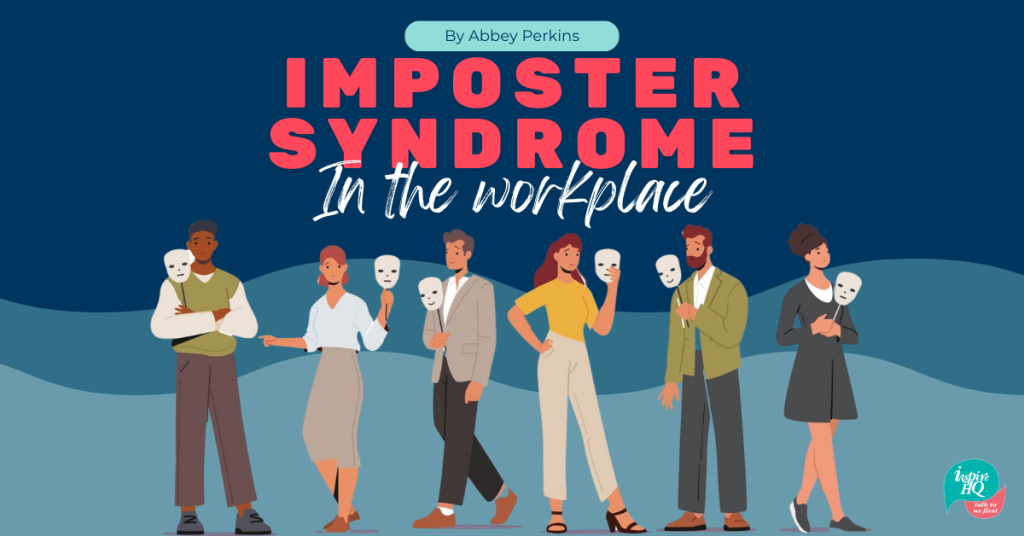Imposter Syndrome is defined as a condition of feeling anxious and not experiencing success internally, despite being high-performing in external, objective ways. This is something that often results in people feeling like a ‘fraud’ or a ‘phony’ and leaves them doubting their own abilities. Those who experience this Imposter Syndrome might find themselves feeling like an ‘imposter’, hence the name, and asking themselves questions like ‘Am I successful….. or am I just pretending to be?’ Or perhaps they feel that they are likely just fooling everyone around them and that it will only be a matter of time before they are caught out and exposed. They might experience feelings of self-doubt and insecurity, have a fear of failing, maybe they constantly strive for perfection and will not accept anything less or have difficulty accepting compliments and acknowledging their wins.
Indeed recently reported in their ‘Wellness at Work: Navigating the path to thriving’ report that 66% of workers believe that their wellbeing at work has a positive impact on their overall self-esteem, hence we can understand how something like Imposter Syndrome, can be so detrimental to someone’s mental health. Imposter syndrome does not discriminate, many of us feel it, affecting everyone including CEO’s of large corporate companies, successful small business owners, the barista that serves you your morning coffee, heck, I too have experienced my fair share of these ‘imposter’ thoughts. While many of us feel it and experience it, this is something that is not openly spoken about in workplaces. So how do we support ourselves and our colleagues to really thrive? How do we combat it?
Practise self-reflection & mindfulness
Try to pay attention to your inner dialogue and try to catch yourself in moments of negativity and self-doubt, especially in regard to your capabilities. Put aside a few moments a day in which you can really be present and reflect on why you may be having certain feelings and thoughts and try to dismantle them before they form a self-limiting pattern.
Embrace your vulnerability
It’s important to remember that everyone experiences moments of negativity and gives into thoughts of self-doubt from time to time, you are only human after all. It can be helpful to share your thoughts and experiences with the people in your life. You may even look to find a mentor to give you guidance and support you in moving past these thoughts and feelings, unlocking your full potential.
Learn to take compliments and praise
A person who is affected by Imposter Syndrome often has difficulty accepting compliments, as they feel that they are not really deserving of them. This one I know can be hard, I personally would much rather fade into the background and let the outcome of my work speak for itself rather than take a compliment, this is something I personally am working on. I am learning to simply say thank you and reflect on the compliment that has been given rather than quickly dismissing it and/or redirecting the praise to someone else.
Acknowledge your area of genius
Ange often talks about people having an ‘area of genius’ – this is a particular area that someone has a passion for, experience in, knowledge of and is a subject matter expert of. Try to objectively reflect on the experience and knowledge you have gained and lessons you have learnt over your career and what makes you the subject matter expert. I bet if you were to put your knowledge and lessons on paper you would surprise yourself with a pretty impressive and hefty handbook. Remember to look at just how far you have come and not just where you have yet to go.
Celebrate your wins
We often celebrate wins for our team’s successes – like smashing a budget, hitting a new record or landing that dream client – but we seldom celebrate our individual success. It is important to celebrate your wins, big and small and practise acknowledging your achievements. By actually recognising and acknowledging the milestones you reach, the KPI’s you exceed and your successes, it rewires your brain reinforcing your capabilities rather than your perceived shortcomings and forces you to accept your success as part of your career story.
If you are an employer, or someone who leads people it is important to check in with your team and if you see some of the signs of Imposter Syndrome you may like to share your own experiences with self-doubt on a personal level or offer mentorship/coaching, encouraging your team to feel safe to discuss their feelings of self-doubt.
Addressing Imposter Syndrome is a collective effort that can lead to a more confident and thriving workforce and it is important to contribute to creating a supportive environment for your team, as an individual and as a leader by encouraging self-reflection, growth and vulnerability.


